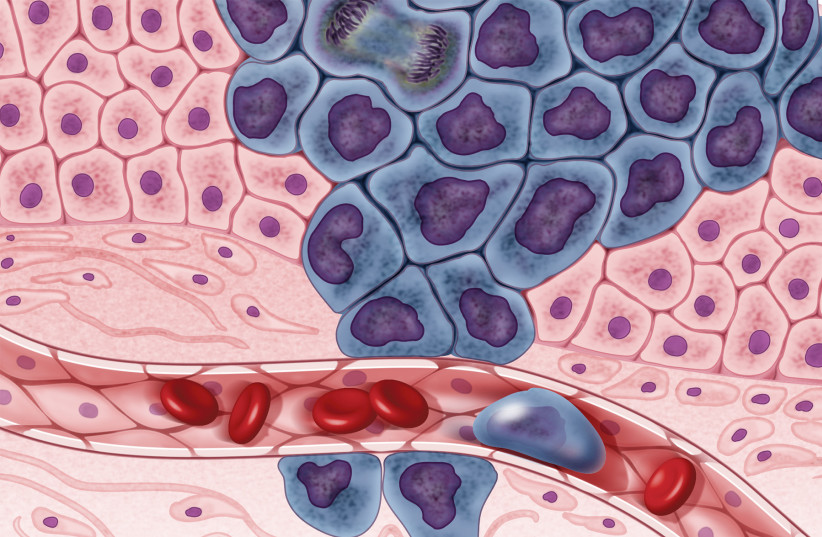Tests for the early detection of colorectal cancer make it possible to prevent its development or to treat it at an early stage, according to the Israel Cancer Association (ICA) that women and men over the age of 50 to perform a simple, free examination at their health fund every year.
Colorectal cancer is the third-most-common malignancy in men in Israel, after prostate cancer and lung cancer and the second-most-common in women after breast cancer, so it is essential to be tested to significantly reduce the risk.
Last year, 3,200 Israelis were diagnosed with colorectal cancer, and 1,300 died from the disease. According to Health Ministry data five years ago, 3,095 new cases of colon cancer were diagnosed here and 1,254 died from it. This compares with the figures in 2012 when 3,139 patients were diagnosed and 1,355 Israelis died from the disease.
Colon cancer, rectal tumors on the rise worldwide
In the ministry’s cancer registry as of 2020, colon and rectal tumors comprised a tenth of all tumors among Jewish men and Arab women, 13% of all cancer cases among Arab men and about seven percent of all tumors among Jewish women. In 2020, colon cancer was also responsible for about 11% of all deaths. In 2020, about 10.6% of new cancer cases worldwide were colorectal cancer.
A new study that examined the outlook for future morbidity and mortality from colon cancer in the world, based on the Globocan data of the International Agency for Research on Cancer at the World Health Organization WHO), determined that in 2020 there were over 1.9 million new cases of colon cancer and 930,000 deaths from the disease, which are 10.7% and 9.7% of all cancer morbidity and mortality cases in that year. Colorectal cancer was more common in men than in women, and 60.4% of the patients were aged 50 to 74.
The researchers predict that by the year 2040, 3.2 million new cases of colorectal cancer and 1.6 million deaths from it are expected. These data reflect a 63% increase in morbidity rates and 73.4% in mortality rates compared to 2020. The study has just been published in the journal Gut.
ICA director-general Moshe Bar-Haim said that “each month in Israel, about 260 new patients with colon cancer are diagnosed. We know that early diagnosis can significantly reduce the risk of developing colon cancer, so I call on the public over the age of 50 to go to the health fund for a free, simple test of occult blood. At the same time, at any age, if you notice symptoms in the digestive system that do not go away, it is important to seek medical attention.”
“The origin of most cancerous tumors in the colon is a benign polyp that turns malignant over time. This is exactly the reason why it is important to perform an occult-blood test in the feces that can indicate the presence of a premalignant tumor. If a suspicious finding is discovered, it is essential to proceed with the investigation, which in most cases will include a colonoscopy, during which photographs can be taken, samples of the colon tissue can be taken and a polyp can be removed, if discovered, thus preventing the development of cancer.”
Ayala Hubert
Prof. Ayala Hubert, director of the Center for Treatment of Digestive Tract Cancer at Hadassah-University Medical Center in Jerusalem’s Ein Kerem and director of the ICA’s gastrointestinal cancer forum emphasized that “The origin of most cancerous tumors in the colon is a benign polyp that turns malignant over time. This is exactly the reason why it is important to perform an occult-blood test in the feces that can indicate the presence of a premalignant tumor. If a suspicious finding is discovered, it is essential to proceed with the investigation, which in most cases will include a colonoscopy, during which photographs can be taken, samples of the colon tissue can be taken and a polyp can be removed, if discovered, thus preventing the development of cancer.”
The ICA will mark International Colorectal Cancer Awareness Month in March with an online seminar on colon cancer on Tuesday, March 14 and an online seminar on rectal cancer on Thursday, March 16. The seminars will include lectures on innovations and updates as well as a panel for questions and answers. To view the full program and to register free of charge, go to the ICA website at the following link: https://www.cancer.org.il.
Lynch syndrome and hereditary colorectal cancer
Following the recommendation of the National Council for the Prevention, Diagnosis and Treatment of Malignant Diseases and the ICA, the Health Ministry urged a test for the presence of Lynch syndrome in anyone who has undergone surgery for colon or uterine malignancy and is under the age of 70.
Lynch syndrome, also known as hereditary non-polyposis colorectal cancer (HNPCC), is the most common cause of hereditary colorectal cancer, and people suffering from it are more likely to get colorectal cancer and other cancers and at a younger age (before 50). The syndrome raises the risk of many kinds of cancer and is passed from parents to children. Families that have Lynch syndrome have more instances of cancer including colon cancer, endometrial cancer and other types of malignancies. Among the syndrome’s symptoms are bloody stool, unexplained diarrhea, a long period of constipation, abdominal cramps, gas pain, bloating, fullness, unexplained weight loss, a decrease in size or caliber of stool, lethargy and vomiting.
One out of every 30 people with bowel or uterine malignancy will be found to be a Lynch syndrome carrier. In the event that the presence of the syndrome is suspected in the pathological examination, the genetic investigation must be completed. If it turns out that a person is a carrier of the syndrome, family members who are first-degree relatives should also be tested to save their lives.
How are sugary drinks linked to colorectal cancer?
A long-term US study with the participation of over 100,000 people showed a link between increased morbidity and mortality from colon cancer and the consumption of sugary drinks. Beverages sweetened with fructose (corn syrup) are a major source of added sugar in the daily menu in the Western diet. Examples of these beverages include caffeinated or decaffeinated colas, other carbonated beverages and fruit-flavored non-carbonated soft drinks.
In a long-term study published in the American Journal of Clinical Nutrition in June 2022, researchers from the epidemiology department at Harvard University and others examined the effect of the consumption of these drinks on morbidity and death from colon cancer.
For this purpose, the researchers followed 121,111 Americans from two databases who filled out nutritional questionnaires about their eating and drinking habits every four years for 30 years until 2014. From the analysis of the questionnaires, it emerged that all the participants consumed an average of 9.9% added sugar per day, but for participants who used to drink one or more sugary drinks per day, the consumption of added sugar almost doubled and stood at 19% on average. During the follow-up period, there were 2,733 cases of colon cancer and 901 deaths from the disease.
The analysis of the data shows that consumption of soft drinks was associated with an increase in morbidity and mortality from colon cancer, compared to participants who did not consume them at all. People who consumed one or more sugary drinks a day had a 38% higher risk of getting cancer in the large intestine and had twice the risk of dying from the disease. No effect of age, sex, body mass, level of physical activity or alcohol consumption was found on these data.
The researchers emphasize that it is known that even moderate consumption of fructose can overload the absorption capacity of the small intestine and thus bring the fructose into direct contact with the proximal part of the large intestine.
In conclusion, the researchers note that the results of the current study support the conclusion that sugar consumption plays a direct role in encouraging intestinal tumors, and reinforce the need for guidelines and policies to limit the consumption of sugary drinks.
The Cancer Society invites the public to contact Telemedia, the phone information service staffed 24 hours a day by calling 1-800-599-995 or to the website at www.cancer.org.il




